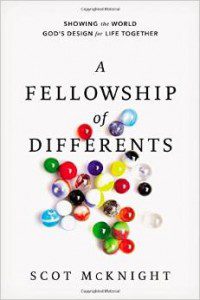 This post is by Tim Suttle, author of the excellent new book called Shrink. We are co-posting with one another today, he on my book and I on his book.
This post is by Tim Suttle, author of the excellent new book called Shrink. We are co-posting with one another today, he on my book and I on his book.
Can a person be a Christian and not be part of the church? Or, is involvement in the church an essential, even constitutive part of what it means to be a Christian?
This question occupies many a blog post and op-ed these days. An alarming number of them tending toward the first answer, that following Jesus is something one can do apart from any involvement in a local church. I wish I could get McKnight’s newest book into the hands of everyone who has bought that line.
“Everything I learned about the Christian life I learned from my church… a local church determines what the Christian life looks like for the people in that church… we all learn the Christian life from how our local church shapes us.” (15)
Hear, hear…
A Fellowship of Differents: Showing the World God’s Design for Life Together is the title of the book. It is essentially a working ecclesiology rooted in a serious study of the writings of Paul.
“The earliest Christian churches were made up of folks from all over the social map,” McKnight says. (19) Churches have always been a fellowship of difference and differents. Christian discipleship is not about what I’m doing as an individual; so much as it is about what I am doing in the mix of this community called the church—a community that is necessarily diverse.
Why, you ask? Because, the love of God is diverse; the very life of God is diverse. Naturally the people and communities created with the specific purpose of imaging this God will be diverse. God has not created a homogenous creation, so why would God desire a homogenous church? “The church God wants is one brimming with difference, and that will mean the Christian life is all about loving whoever happens to be with you in this fellowship of differents.” (67)
McKnight’s book is more than just an argument for diversity; it’s a thorough exploration of the apostle Paul’s vision for the church. It’s an ecclesiology, but one that is accessible to the average church member, and deep enough to keep the attention of theology-nerds. That’s a difficult needle to thread, and it’s McKnight’s specialty.
McKnight wants us to fall in love with Paul’s view of the church, a view that is capacious in nearly every respect—gender, socioeconomics, race, culture, style, moralities, politics, language, ages, marital status, and so on—but single minded in its devotion to Christ as Lord.
One of my favorite sections comes late in the book when McKnight talks about Paul’s view of faithfulness. He notes that the English word for faithfulness is actually the word faith in Greek. One must determine from the context whether the word means faith orfaithfulness. Sometimes we can’t even tell which one it is. What we know for sure is that Paul’s vision for the church was that they would walk faithfully over the course of a lifetime—that they would finish the race.
It is at this point that I see such deep resonances between McKnight’s work, and the argument I’m making in Shrink. We cannot remake the church in the image of the American Dream. The Jesus way is down. McKnight writes:
“What the church most needs is not heroes of the faith, but faithful followers of Jesus. What your local church needs in order to live out the designs of God for a church, that grand social experiment of bringing all sorts of people to the table and into the circle of one another’s lives, is not great Christians, but faithful Christians.” (164)
Ministry greatness is not the goal of the church. Faithfulness is.
McKnight is careful to guard against any sense that we can accomplish anything useful to God by virtue of our own strength:
“Faithfulness is not our own strength muscled up by determination and discipline and grit; nor is it our strength combined with God’s strength. Faithfulness happens when God’s strength is unleashed in us as we look to, lean on, and love God.” (165)
Faithfulness is not about what we can accomplish in our own strength, but about what we can embody as God’s strength unleashed in our lives through our own weakness. What do we embody? Look to the subtitle. We embody nothing less than: God’s design for Life Together… The church embodies God’s design for human communities. “Everything I have said up to this point leads to one grand synthesis,” McKnight says. “God’s mission in this world is to create the church where God’s will is lived out by all of God’s people.” (183)
If the church will take it seriously, A Fellowship of Differents can do for our view of the church what Blue Parakeet did for our view of the Bible. McKnight’s vision for the church—or rather Paul’s vision as described and explored by McKnight—is not about a monolithic fellowship of the doctrinally pure and piously holy. It is not a place that self-made men and women to gather with their chosen affinity groups and pat each other on the back. The church is a challenge to the ways in which the brokenness of the world seeks to divide us. The church is God’s vision for human communities.













